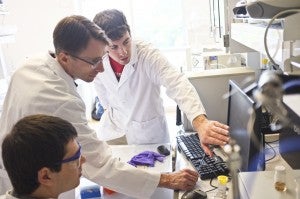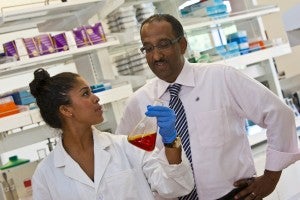
Discover New Cures.
The world’s got a lot of illness and disease that needs curing, and at URI, leading scientists are breaking new ground toward the discoveries we’ve all been waiting for. Inside our Natural Products Lab, Pharmacognosy Professor David Rowley – one of the only a handful of marine microbial chemists in the world – and his students are turning to the worlds’ oceans to tackle the problem of drug-resistant infections.
“Most of the current antibiotics derive from natural products produced by terrestrial microorganisms, so as we try to stay one step ahead of the pathogens, the logical next place to look is at marine microbes.” Right now, they’re studying bacteria found in mud sediment from a remote region of the South Pacific. He says preliminary results are promising, with microbes that are “perhaps unlike any others that have been investigated.”
In the Bioactive Botanical Research lab next door, Pharmacognosy Professor Navindra Seeram has some big ideas about fighting cancer. Ideas so big that he’s regularly sought after by science and news publications around the globe for his expertise in the healing properties of medicinal plants.
He and his team of students and researchers are studying the natural antioxidants in native New England berries for possible applications in the treatment of cancer. In fact, as an undergraduate student in Professor Seeram’s lab, Caroline Killian discovered that the Jamun berry, found in Hawaii, Florida and Texas and traditionally used as a pre-insulin treatment for diabetes, inhibits the cell growth of a particular aggressive type of breast tumor. Recently, NPR did an interview with Professor Seeram about medicinal properties of local plants.
Bottom line is – if you’re someone who wants to give people more access to better treatments, antibiotics, and vaccinations and improve human health everywhere in the world, URI might be the place for you.
At our Providence Biotechnology Center, Research Professor Alan Rothman has received an $11.4 million grant for his ongoing research on dengue virus, a potential deadly mosquito-borne disease that infects 100 million people every year. Professor Rothman, along with his students and collaborators at several American universities, a private biotechnology company, the Walter Reed Army Institute of Research, and the Armed Forces Research Institute of Medical Sciences in Bangkok, Thailand, will conduct field studies, laboratory research, and a phase-three vaccine trial. He’s one of several big thinkers at URI’s Institute for Immunology and Informatics – better known as iCubed – focused on designing better, safer vaccines for neglected diseases and using the highest of high-tech equipment and techniques to do it more quickly than traditional methods.
 Biomedical Sciences Professor Nasser Zawia and his students are doing research to better understand and unravel the mysteries of the brain. He’s examined Alzheimer’s disease in mice, monkeys and rats, and his findings have not only earned international attention but could lead to major breakthroughs in treating the disease. He’s proven that infant exposure to lead is linked to Alzheimer’s, and his latest research on an anti-inflammatory drug used to treat migraines in Europe has led to human clinical trials as a treatment for Alzheimer’s in the U.S. He says the drug could mean the different between just treating Alzheimer’s symptoms and actually helping patients get better.
Biomedical Sciences Professor Nasser Zawia and his students are doing research to better understand and unravel the mysteries of the brain. He’s examined Alzheimer’s disease in mice, monkeys and rats, and his findings have not only earned international attention but could lead to major breakthroughs in treating the disease. He’s proven that infant exposure to lead is linked to Alzheimer’s, and his latest research on an anti-inflammatory drug used to treat migraines in Europe has led to human clinical trials as a treatment for Alzheimer’s in the U.S. He says the drug could mean the different between just treating Alzheimer’s symptoms and actually helping patients get better.
For Professor Rowley, and all of these top researchers in their fields, another very important aspect of the work is training the next generation of scientists to develop new cures. “Students are the prized products of our research here. Diseases are becoming more and move prevalent, and they continue to evolve. Our students are the future researchers who will be involved in making important scientific discoveries for years to come,” he said.

